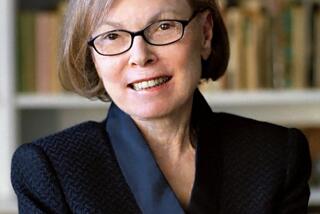Frances Macgregor, 95; Social Scientist
- Share via
Frances Cooke Macgregor, who forged an eclectic career that included professional photography, sociology, anthropology and pioneering work with the psychological problems caused by facial deformities, has died. She was 95.
Macgregor, who wrote, photographed or co-wrote a half-dozen scholarly books on subjects ranging from American Indians to plastic surgery, died Dec. 24 of congestive heart failure in her Carmel, Calif., home, said her executor, John Murphy.
A professor at Cornell University Medical and Nursing School from 1954 to 1968, Macgregor later taught at the New York University Medical Center’s Institute of Reconstructive Plastic Surgery.
She is credited as the first scholar to document the major social and psychological stresses of patients who suffer facial disfigurement through birth, accident, disease or war. She continually warned doctors to treat psychosocial problems associated with even the most rudimentary cosmetic surgery.
“Changing a nose doesn’t change a personality; not even if one goes from ugly to pretty,” she explained in a 1981 article in Newsday. “... Has the nose been used as a scapegoat for human shortcomings? Has it been wrongfully indicted as the reason for lack of social success? If such are the considerations behind the operation, then other emotional problems may surface.”
Born in Portland, Ore., on April 21, 1906, and reared in San Rafael, Calif., Frances Cooke grew up steeped in helping those with disabilities because of her parents’ work with Guide Dogs for the Blind.
She earned a bachelor’s degree in economics at UC Berkeley, married anthropologist Gordon Macgregor and spent the next several years following him through the West on his rounds for the U.S. Bureau of Indian Affairs.
The photos she took on reservations during that period were turned into her 1941 book, “Twentieth Century Indians.” Those photographs and other materials she collected to document the lives of Native Americans in the 1930s are now a part of the Smithsonian Institution in Washington, D.C.
Other photos she took crisscrossing the country became illustrations for the book written by her friend Eleanor Roosevelt, “This Is America,” published in 1942.
Macgregor collaborated with sociologist Margaret Mead, on the 1951 book “Growth and Culture: A Photographic Study of Balinese Childhood.”
Intrigued by her various observations, Macgregor obtained a master’s degree in sociology and anthropology at the University of Missouri in 1947. She did additional graduate study at Columbia University and in the late 1940s became a research associate at NYU College of Medicine, continuing work on psychological and sociological aspects of facial deformities and plastic surgery.
She interviewed hundreds of patients and their families, and over the years wrote three books that became known to surgeons, nurses and other medical personnel as “Macgregor’s trilogy.” Her research and the three books--”Facial Deformities and Plastic Surgery,” “Transformation and Identity” and “After Plastic Surgery”--fueled development of many self-help and support groups for patients and their families.
During her tenure at Cornell, Macgregor also wrote a textbook on nursing.
She moved to Carmel about a decade ago. Her final area of research was medical errors and improving safety for patients. Three years ago she established the Frances Cooke Macgregor Awards to fund research into medical errors.
Widowed in 1984, Macgregor left no immediate survivors.

